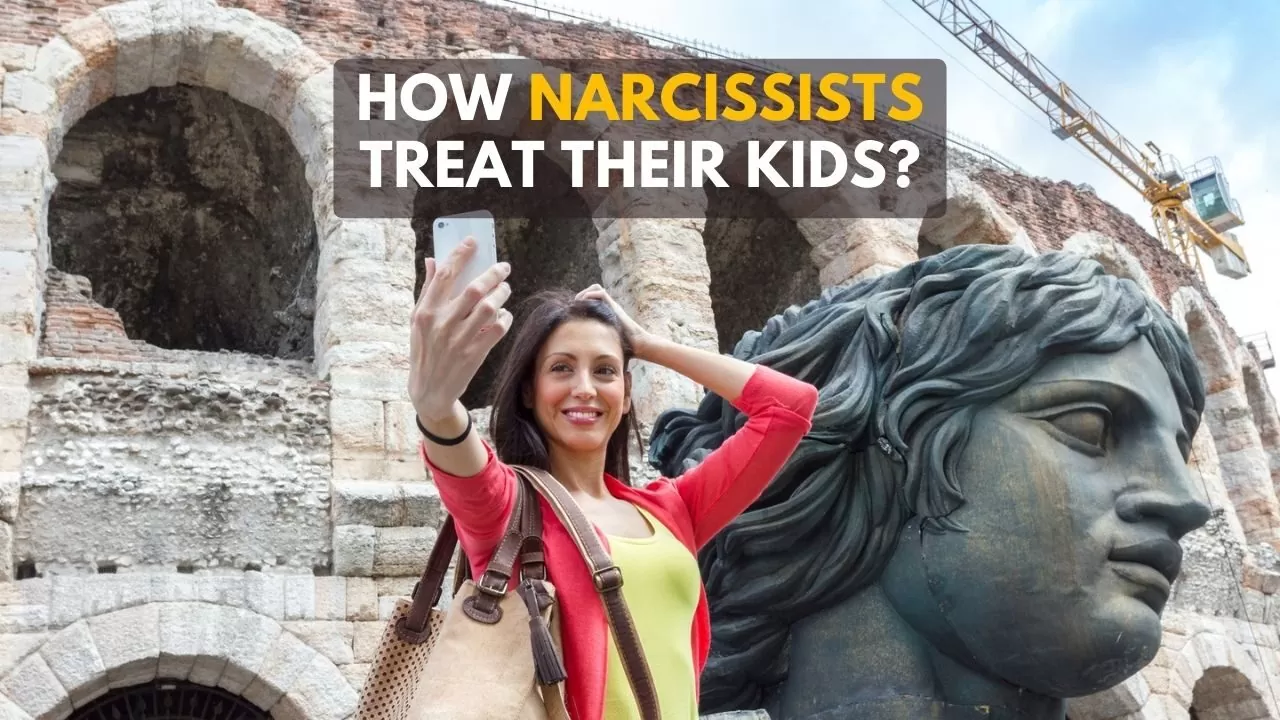Today's Thursday • 6 mins read
Children of narcissists learn that love is abuse. The narcissist teaches them that if someone displeases you, it is okay to harm them and call it love. ― M. Wakefield
Knowing how narcissists treat their children will break your heart. They often leave their children with feelings of guilt, shame, and indignity that they will carry for the rest of their lives.
Normal parents love their kids unconditionally, empathize with their struggles, and guide them through life’s experiences. This is never the case with narcissistic parents.
Narcissistic parents abuse their position as the person in charge of empowering their child, becoming the source of their child’s disempowerment.
They play the evil parent in a parent-child relationship.
How Narcissists Treat Their Children?
Narcissistic parents often emotionally and physically abuse their children. They set unrealistically lofty goals for them, never feel entirely satisfied with their child’s achievements, and constantly raise their expectations of them. They use their children as a source of their narcissistic supply.
Narcissists, by nature, have an inflated sense of self-importance, a lack of empathy, and a need for praise. This makes them overly possessive, controlling, and demanding parents.
They are also sensitive and reactive people, with little self-awareness or empathy for others. This makes their children fear them, uncertain of when and how they may react to their behavior.
A narcissist’s authoritarian style of parenting, frequently bordering on dictatorship, breaks their child’s courage and suppresses their independence.

Narcissistic parenting can be extremely damaging to a child’s development.
It could leave the child with low self-esteem and confidence. They may grow up feeling powerless and unable to make their own decisions.
They reduce their children to mere tools to satisfy their selfish desires, thus enabling their narcissism.
A narcissist’s child is obligated to praise their parent for everything they do or say. They must support and respect the narcissist.
Narcissistic parents draw validation from their child’s accomplishments and successes. So, they put their child under constant pressure to perform and meet their high expectations.
Meanwhile, the narcissist may also use their child as a sounding board for their own frustrations and insecurities, placing emotional burdens on the child.
Narcissists don’t see their children as separate people that have a right to experience life from their own angle. There is no option in their heads in which the kids will be in charge of their own lives ‘unaided’ by the narcissist. ― Diana Macey
How Do Narcissists Damage Their Children?
- Narcissistic parents can erode a child’s self-esteem, leaving them with feelings of low self-worth and high self-doubt.
- A narcissist’s child often does not learn how to set boundaries, express their needs, or voice their issues.
- Since the narcissist may see any raising of voice as insubordination and affront, their children become submissive and silent.
Children of narcissistic parents may develop lifelong difficulty in setting healthy emotional boundaries.
Even as adults, they don’t quite accept that they can refuse a person’s entry into their personal space. They find it hard to say “No” to others or express their desire to be left alone.
As victims of their narcissistic parents, they keep overthinking their past mistakes and can never forgive themselves.
Sadly, the child may learn some of their parent’s narcissistic behavior and carry it into their other relationships.
Children of narcissistic parents are frequently narcissistic to their partners and spouses.
Do Narcissists Realize The Harm They Cause Their Children?
No, narcissists may not realize the harm they may cause to their children because of their lack of self-awareness and an inability to act out in empathy.
Narcissists place their own needs and desires above those of others, and see their children as extensions of themselves rather than as separate people.
This makes them decide and act on behalf of their child without seeking their opinions, making the narcissist feel validated and superior.
Narcissists may abuse their children physically and emotionally to make them comply with their wishes and fulfill their dreams.
Such children often suffer much to win awards and recognitions and never feel satisfied until their parent approves of their achievement.
Long after the passing away of a narcissist, their child may sigh, “Mom/Dad, I hope I made you proud today.”
Mostly, a narcissist parent is not completely happy with their child’s achievements. They would also not give full credit to the child for their success, and often boast to others about how “they made their kids” into achievers.
The child of a narcissistic parent often grows up feeling invalidated, disregarded, and exploited for their parent’s narcissistic gain.
Though most narcissists are clueless about the pain they inflict on their children, some of them are aware of the harm they are causing, yet do not care. They are so busy meeting their own needs that they cannot see how their actions have affected others.
FAQs
Can A Narcissist Care About Their Child?
Do Narcissists Discard Their Children?
Final Words
Narcissistic parents leave a long-lasting, painful scar on their children. They may triangulate one child against another to sustain their narcissistic supply, making you fight with your siblings.
Remember, they are dysfunctional parents who will never apologize, even if you show them how much hurt they have given you over the years.
Seek professional help if you are the child of a narcissist, in a relationship with a narcissist, or feel your child needs protection from any harm caused by your narcissist spouse.
Narcissists are always seeking a new source of narcissistic supply. Keep this in mind to feel less upset when they dump you.
• • •
Author Bio: Written and reviewed by Sandip Roy — a medical doctor, psychology writer, and happiness researcher, who writes on mental well-being, happiness, positive psychology, and philosophy (especially Stoicism).
√ If you liked it, please spread the word.
» You deserve happiness! Choosing therapy could be your best decision.
...
• Disclosure: Buying via our links earns us a small commission.